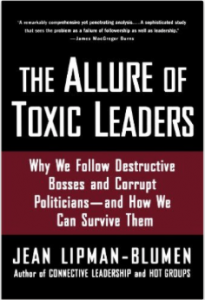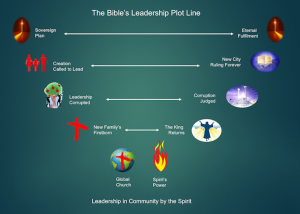Home » Leadership (Page 2)
Category Archives: Leadership
What Is Your “Transformational Question”?

Questions are powerful. Getting to the right answer begins with asking the right question. A particularly probing question can press us toward new perspectives, new insights, new methods. A very few questions–just the right questions–can stimulate wide-scale transformation
The Power of a Transformational Question
Robert Quinn relates the experience of consultant Kurt Wright who was working for a huge software project that involved a $100 million dollar contract. 400 hundred engineers were 38 months into a 60-month schedule. The project was slipping behind every month and was now 18 months behind. Worse still, if the project was not on schedule within 10 months, the contract required the company to pay a $30 million penalty. Disaster was 10 months away.
What would you do? Crack the whip and urge people on? Fire the managers responsible for the slippage and hire new ones? Give up?
After many conversations with people involved in the project Wright concluded that he had to change the fundamental “scripts” that were controlling the workers’ assumptions and behaviors. To galvanize everyone’s efforts and establish a new positive vision he concluded that it was necessary to change the underlying question. In short, those 400 engineers and managers needed a new and transformational question.
What would it take to finish one week early?
The question had to be creative, frame-breaking, and visionary. It had to capture imagination and motivate wholehearted commitment. Through a series of two-day retreats, Wright finally hit on the critical transformational question: “What would it take to finish this project one week early?”
On the surface, Quinn says, the question was ridiculous. Everyone was already trying to finish the project “on time” in a 5 year contract “one week early” is hardly different from on time. Besides that, going from 18 months behind to one week early seemed an impossible goal. And yet the question was powerful. It rewrote the underlying script by injecting a new frame for conversation. A few people began to take the foolish question seriously and then more joined in.
(more…)Courage to Oppose Toxic Leaders
He shared in their humanity so that he might free those who were held in slavery by their fear of death. Hebrews 2:14-15
“How does the resurrection of Jesus transform your understanding and practice of leadership?” If someone asked you this question could you answer it clearly?
If this most pivotal event at the core of our faith doesn’t have an impact on how we lead then surely something is wrong. Isn’t it?
Toxic Leaders and the Fear of Death
As I thought about this point, I recalled a fascinating analysis of toxic leadership provided by Jean Lipman-Blumen in her book on toxic leadership. As with other poisonous things, these leaders come in varying degrees of toxicity.

Petty Tyrants. Some are mildly poisonous—one might say “not altogether bad”—and are found in small domains, offices, churches and ministries. They set unreasonable goals, promote excessive internal competiton, and create cultures of blame.
(more…)Building Value Into Your Life

You long for a life of significance!
You don’t crave fame. You’r not trying to become powerful. Pursue these things and in the end you may discover you’ve squandered your years. So what does it take for life to be significant?
The teaching of Jeremiah gives us important clues.
“I knew you before I formed you in your mother’s womb.
Before you were born I set you apart and appointed
you as my prophet to the nations.”
— Jeremiah 1:5
We learn that:
- God prepared him from birth for a life of godly significance. He has done the same for you.
- God appointed him to do significant work. He has good works for you to do, too.
Significance begins with the imprint of a great maker!
From the moment you were born you’ve been a treasure to Him. Yes, it’s true! He formed you personally in your mother’s womb. You are a unique and special creation of the Maker of Heaven and Earth Himself. I once stood in front of a glass case containing a collection of the fabulous, jewel-encrusted “Easter eggs” created by Peter Carl Fabergé for the Czars of Russia as gifts for their wives and mothers. A single Fabergé egg was recently estimated to be worth more than $30 million dollars. A violin made by the famous Antonio Stradivari is vastly more valuable than even the best modern instrument.
(more…)Is Your Vision Creating an Adaptive Gap?

It is often said that if leaders want to see high achievement they must cast bold visions. It is less often pointed out that proclaiming a large vision creates a gap between the vision and the current reality that must be managed. Ron Heifetz, in his book Adaptive Leadership puts it this way.
“Adaptive challenges are gaps generated by bold aspirations amid challenging realities.”
Vision Creates Gaps
“Wait a minute,” you say, “I was hoping that my leadership vision would help things move ahead. I wasn’t trying to create gaps!”
But that is precisely what true vision does. True vision calls us to venture into unknown territory, to take risks, to innovate — “to boldly go where no one has gone before.” Or, to put it in Heifetz’s terms, vision creates a gap between current realities and the preferred future. The bolder the vision and the more challenging the realities, the larger the gap. Good vision casting understands this. It’s goal is to “widen the gap” in a way that appeals to our desire for achievement and sense of adventure.
Gaps Call for New Learning
One of the most powerful ways to frame the gap between reality and vision is to understand it as a challenge that calls for adaptation and new learning. The way to bridge and adaptive gap is not to work harder. You’re probably already working as hard as you can. Instead, an adaptive challenge is a call to work smarter, replacing current strategies, tools, and methods with new ones that help you move faster and farther with the same effort.
(more…)Leading by the Spirit through Community

Leadership models matter because they influence how we think, and how we think determines how we act. Are there distinctive principles that should mark we lead in God’s work? If so what are they?
To focus the question more, let’s ask, “What is that makes leadership in a Great Commission movement unique and different from leadership in other areas of activity?” The only way to answer this question is to dig into the same book that gives us the Great Commission: the Bible. What can the Scriptures teach us about what makes leadership in God’s work unique?
The Bible’s Leadership Story
Rather than looking at specific texts, I’d like to “open the lens” and consider the grand sweep of the Bible’s “leadership story” across the whole span of our creation’s history. The diagram below attempts to capture the main principles.Staring from the top we have:
(more…)God’s “One Conversation”

Around the world billions of people are trying to have conversations with God. Some want to talk with Him about health and healing. For others, the topic is “dates and mates.” Wealth, power and fame are high on the list of hits.
God’s Conversation
God wants to talk with people even more than they want to talk to Him. But He has a different topic in mind: life. We might say that God has in mind one conversation. The form and details will be different, but God wants to talk with people about life.
God Wants to Help Us Find Life
One day Jesus sat by a well and asked a woman drawing water for a drink and began a conversation about water. The water he had to give, Jesus said, was so rich in the essence of life that whoever drank of it would never never be thirsty again. So vital was this water that it would well up into eternal life itself. Some water!
God Wants to Help Us Live Life
On another occasion Jesus pointed out that people work daily for food that spoils, but in him they could find a bread that would never spoil. So rich was it that whoever ate of it wold never be hunger again. It was another conversation about life. “I am the bread of life,” he said. It was the kind of shocking claim that could be made only by one who was either a fraud, a lunatic, or someone who truly was who he claimed to be.
To an old man, he said, “You must be born again,” explaining that although human life ebbs away day by day the new life that is born through the power of the Spirit will last forever.
(more…)
